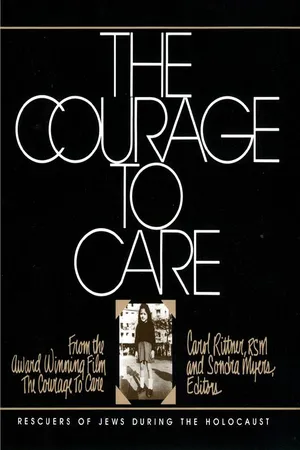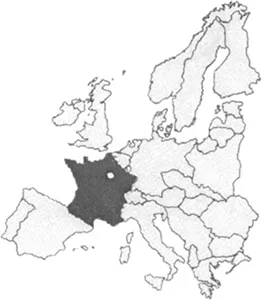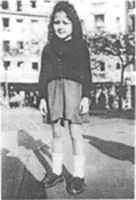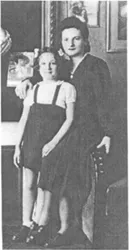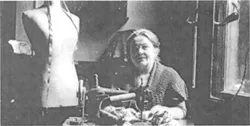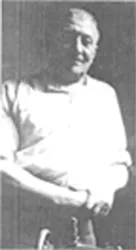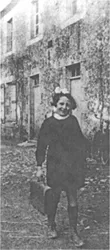![]() STORIES OF RESCUE
STORIES OF RESCUE![]()
ODETTE MEYERS
My parents emigrated from Poland to France. Although they were quite poor, working-class people, they were politically conscious, having left Poland for political reasons in the late 1920s. As an only child, I was fussed over a great deal by my parents and others. I remember that life seemed very busy and cheerful. There were many friends who would come to visit my parents and lots of picnicking. It was a good life, until the war started.
FRANCE
My father joined the army in 1939. Almost immediately, he became a prisoner of war. My mother and I lived in an apartment in Paris where she was an active member of the resistance. Things were very dangerous.
In the beginning of the occupation of Paris, the German soldiers offered the children candy and chocolate, and they tried to be friends with us. But we children were told that the candy was poisonous. I knew it was true because people were disappearing in my world. They were either leaving the country, or they were being deported, or they were taken to a camp. I found the soldiers terrifying. Once, when I was wearing the Star of David on my coat, I saw some drunken German soldiers. Of course, we Jews were always supposed to show our star, but I covered mine with my school bag. They came close—they were laughing—and I felt from them a great sense of brutality and danger. For some reason, they took an old Jewish woman who was walking behind me, and they dragged her by the hair. I don’t know why—perhaps because they were drunk, but 1 remember distinctly that I was terrified.
On July 16, 1942, the Nazis struck, and 13 thousand stateless Jews in Paris were rounded up by the French police and taken into a stadium called the Velodrome d’Hiver. Thousands of people were taken into the sports stadium. When they tried to round up women with their children, some of the women jumped out of their windows. There were 51 suicides of that kind. Mothers jumped out of windows with their children rather than be taken by the police, who took everyone, every Jew: women in labor, old people, dying people—they actually took some dead bodies. Everyone. Men without families were sent directly to Drancy, while thousands of others, mostly women and children, babies, old people, the dying, and so on, were sent to the Velodrome. They were kept there for seven days. Later, they were sent to detention camps like Pithiviers and Beaune-la-Rolande. Still later, these Jews were sent farther east to Auschwitz and Birkenau. Among the 13 thousand Jews arrested in Paris in July 1942 were 4,051 children. If it had not been for the woman who saved me, I would have been number 4,052.
The concierge of our house was a woman named Marie Chotel, whom everyone in the neighborhood loved and affectionately called “Madame Marie.” She lived downstairs from us. There was a kind of corridor between her apartment and the front door. One day, at about five o’clock in the morning, she ran up, yanked us out of bed and said, “They are coming for you!” She threw us quickly into her apartment and put us, my mother and me, into a broom closet and closed the door. When we had gotten out of bed, we had grabbed clothing that had the yellow star on it. So while we were in the closet standing up, my mother, for some reason, was trying to unstitch the star.
The search team came in, and Madame Marie immediately, with all her peasant shrewdness, put on a terrific act of being the stereotypical concierge, like the one on postcards and in stories: the local gossip, the perfect French anti-Semite. When she greeted the search team she said, “How wonderful that you are clearing France of all Jews. I’m so honored that you have come here. Please have a glass of wine,” and so on.
They kept asking for us, and she exclaimed, “Oh, those Jews. You know how they are. They live in poor places like this, but they all have money. They have gone off to their country home. I can’t afford it. But they certainly can.” She carried on and on that way, and they believed her. She kept pouring them more wine. At a certain point, one of them got suspicious and said, “You know, lady, if you’re not telling the truth, if they are being hidden somewhere, you’ll suffer the same fate.”
Odette Meyers was only seven years old when the Nazis rounded up the French Jews in Paris.
They wanted to go and see the apartment. She said, “Oh, my God, you wouldn’t want to see their apartment. You know how Jews are; they’re absolutely filthy. French people are very clean. The Germans are very clean. But the Jews, especially the ones from Poland, they’re so dirty.” She went on and on. She poured more wine, and they stayed put. They didn’t go into our apartment. In the meantime, of course, standing there, I had two feelings. One was, “How can she say such terrible things about Jews or about us? My mother is a good housekeeper, everything is clean.” On the other hand, my real, strong feeling was, “I am safe.” If Madame Marie is taking care of things, she is taking care of things. She had this conviction that I was her charge, and she was going to protect me. So I figured that she was doing what she had to do.
Madame Maries husband, who was called “Monsieur Henri” by everyone, was a member of the underground. He was fetched from his job and he came immediately. Monsieur Henri was a big man. I was quite small, only seven. We walked outside. There were German soldiers everywhere. I remember that. He held my hand. I was trembling. My hand was shaking. I remember that there were trucks full of Jews being rounded up, and he told me, “Remember, look at your feet and keep on walking.” It was like the refrain to children from the whole occupied Paris, “If anyone calls you don’t answer. Don’t look up. Don’t answer.” So we walked like that. Nobody called. And I looked at my feet as we walked. We reached the subway entrance, and I remember a wonderful sense of safety as I went down into the subway. I was saved, and hidden by Catholics, because this man took me to safety.
The subway station was almost deserted, and we had to wait for a metro, a subway train, to take us to the railway station. There we met with other children and a gentile woman who was to accompany us to our hiding place in the country. It was prearranged by the Resistance. It was a liaison between the Jewish women in the Resistance and the Catholics in the Resistance. I ended up in a Catholic village for the duration of the occupation.
If I had not been saved by this man and woman I know precisely what my fate would have been. I would have ended up in the gas chamber at Birkenau. All the children who were taken that day—and 95 percent of the Jewish children in Paris were taken that day—perished. Only 5 percent were saved. The children were all taken into the gas chamber at Birkenau. None survived, so my fate is very clear. I know for certain that helping me, getting me into hiding was a question of saving my life. That is absolutely clear.
Odette Meyers with her mother, a woman active in the Resistance. Her father was a prisoner of war.
Madame Marie had a very simple philosophy. We were Jewish and she did not want to impose her religion on us, but she told me a story. “The heart is like an apartment,” she said, “and if its messy and there is nothing to offer, no food or drink to offer guests, nobody will want to come. But if it’s clean and dusted every day, and if it’s pretty and there are flowers and food and drink for guests, people will want to come and they will want to stay for dinner. And if it’s super nice, God himself will want to come.” That was it.
Whenever I would do something wrong, she would put me on a high stool facing the wall, and she would say to me, “I think you have some housework to do.” It was my business to figure out how I had messed up my heart in some way. I had to get a broom and dust pan and get to work. That was her philosophy and what she taught me. It has been important all through my life. She was so important to me that even her name, “Marie,” meant a great deal to me. When I was living in the Catholic village and had to pass as a Catholic, it was all very bewildering to me; I had so much to learn. I found out that the peasants in that village affectionately called the Virgin Mary, “Madame Marie.” It was then that I knew that I would be safe. I figured, “If they have one—a “Madame Marie”—here, then Tm OK!”
During the war Madame Marie helped in all kinds of ways. For anyone who was connected with me and my family she was a protector. She protected my parents and everyone who knew my parents. After a while, there got to be quite a few people, partisans and Jews, in our apartment when it was vacant, as it was during the war and while we were in hiding; Madame Marie used it for others as a refuge. She used it at her discretion, which was always correct.
“Madame Marie,” the concierge in Odette Meyer’s apartment building. She awoke Odette and her mother in the early morning to warn them the Nazi search teams had come for them. She hid them in a broom closet in her apartment, and convinced the Germans the family had gone to their country home.
After the war, when we came back to our apartment, we found that our next-door neighbor was gone. While we were living in the apartment, we worried that this young woman would endanger our safety. She was one of those who was a mistress to a German officer, and so it was dangerous when my mother was talking to people in the Resistance or having people come over. When we came back and she was not there, my mother s first question was, “What happened to our neighbor? Did they take her and shave her head?” They were doing such things to women who were with Nazis.
Madame Marie exclaimed, “Oh no, they didn’t. They wouldn’t dare to touch her. I took care of her; she’s safe. She wasn’t the one who caused the war. She was a poor young woman who dreamed of having pretty clothes and being taken to the opera by a soldier in uniform. She didn’t cause the war. It wasn’t her fault. She’s OK. Don’t you worry.” That was her attitude.
Always there is the question of why: Why did the rescuers do it? The rescuers usually say, “It was nothing. Why all the fuss? It was the natural thing.” I believe them.
Madame Marie also had that feeling. I really think that for her, as for others, it was absolutely the natural thing. The reason is that even though most of them were so-called “simple people,” with little education, they were really the most advanced form of human beings. They were, in a sense, “geniuses.”
One of the things that geniuses often do, researchers tell us, is break rules; they break all the rules. I would say that one of the things that saved me was the fact that in thought and action, even in her life-style, this woman broke rules, yet she was a genius at humanity. She was not just a “Righteous Gentile.” She was a good person, perhaps one even could say, in an evolutionary sense, an advanced human being.
Monsieur Henri was summoned from his job to take Odette Meyers to the metro. German soldiers were everywhere, and M. Henri told her “Look at your feet and keep on walking. If anyone calls you, don’t look up, don’t answer.”
Madame Marie’s background and life were quite unconventional. She was born to an unwed mother in the village of Vanifosse in Lorraine; she didn’t have much of a formal education. She started in life, at a very young age, as a chambermaid in a home, then she worked as a waitress, and she ended up being a concierge. She was the concierge in our apartment house in a day when one’s life was at the mercy of the concierge. She was the concierge of four floors. Every tenant was her charge. She was somewhat unconventional. For example, she was living out of wedlock and so was involved in breaking various laws of the Church. She didn’t go to church too often but she lived a good life, nevertheless. She was a kind of rough and tough, down-to-earth woman, very round, very pleasant, very vigilant, and very protective of her territory. She was not at all sentimental; in fact she was quite the realist. It was very lucky that we came into her territory.
When my parents came to that apartment, they were the only Jews in the building. She sensed that there were anti-Semitic neighbors around them. So, when I was born, perhaps because she was childless and wanted to have a special bond with a baby, she simply declared to all the tenants and everyone in the world that she was my godmother, and that was that. Although she was a Catholic, the Church had nothing to do with it. She functioned, somehow, outside the mainstream, outside the Church. She was my godmother and she didn’t let anyone have any doubt about it. No one crossed her. She simply did not allow a single anti-Semitic act toward me and my family on her territory.
I do think that good people, simple people are much more complicated than evil people, which is one reason perhaps why we don’t bother with them so much. Madame Marie is not, I think, atypical of rescuers. A lot of people who helped the Jews, who took the risk, were so-called simple people. One theory I have is that because they were not so literate or formally educated, they had to do their own thinking at all times. They didn’t follow what was “taught” them; they figured out everything for themselves. They had to think through everything. I think her story about how the heart is like an apartment and how you have to clean it everyday gives a sense of that. One must live and consider and reconsider all the time. She would say, “I think that values are your responsibility, they’re not something given from the outside.”
Odette Meyers in the Catholic village where she lived during the occupation.
I think people like her do more of their own deep thinking, and make their own decisions because they are more outside of that part of society that molds everyone the same way. I think Madame Marie thought with her heart, that was the important thing. And maybe that’s why she did what she did for us and for many other people connected with us. Her principles came from making decisions according to her heart, her conscience, her own mind. In every single situation, each time, she did what she had told me to do: to do a dusting and a cleaning of my heart every day, to see to it that everything was all right. She saved not only my life—my physical life—but my spirit also.
There is a Jewish proverb that I love. It says, “If you are in a place where there is no human being, be a human being.” I think the business of being a full human being takes a lot of energy and a lot of strong thinking, and that you must think things through by yourself, based on your own experience. That’s what I learned from Madame Marie.
Odette Meyers is a survivor of the Holocaust As a child, she was hidden by Catholics and members of the Resistance in France. She now lives in Berkeley, California, where she is a university professor and a poet. ...
